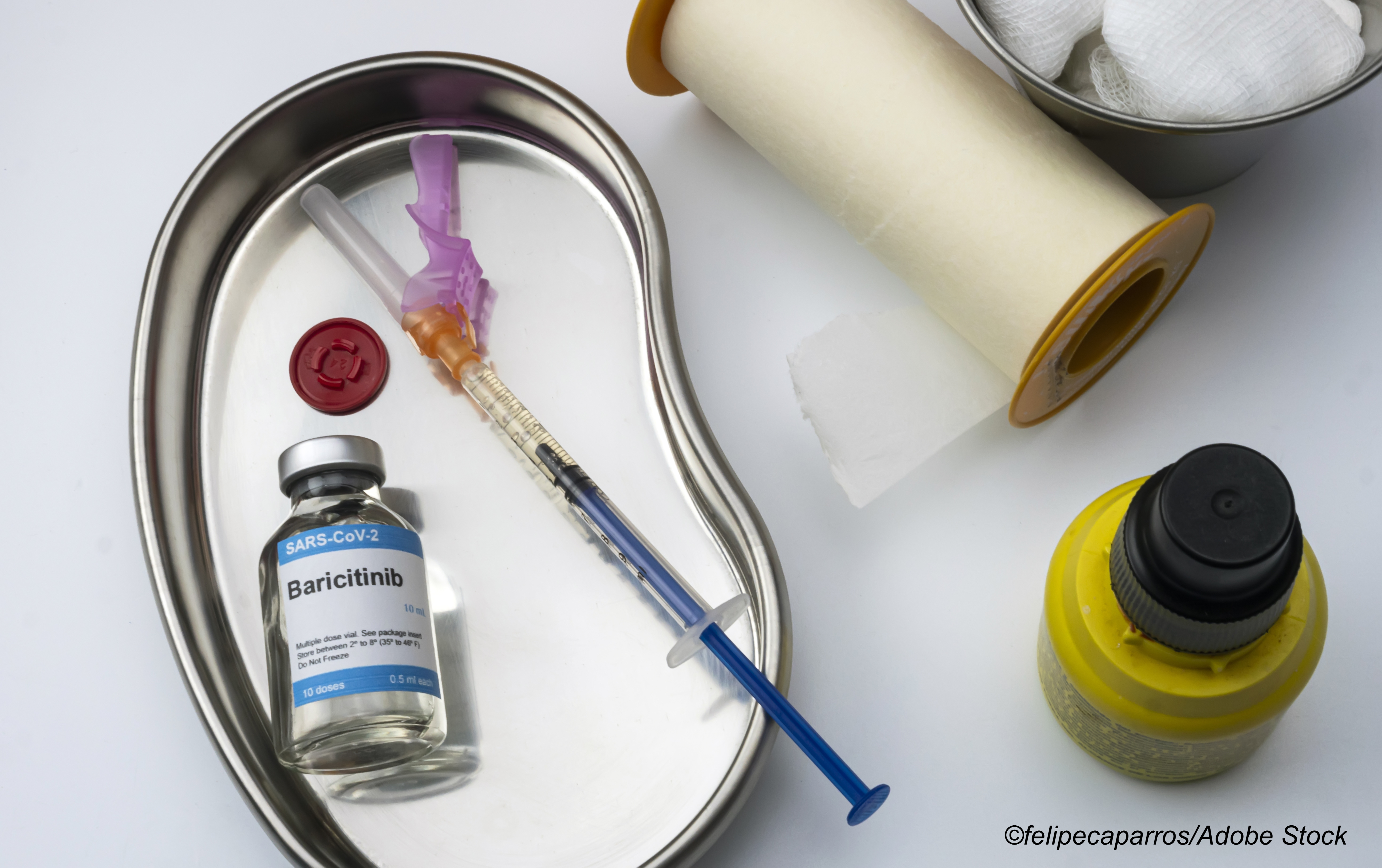
Treatment of hospitalized Covid-19 patients with the selective Janus kinase (JAK) inhibitor baricitinib, along with standard of care including dexamethasone, was associated with reduced mortality but not reduction in disease progression in the international, multicenter, phase III COV-BARRIER randomized trial.
Baricitinib plus standard of care was not found to significantly reduce the study’s composite disease progression endpoint, which included progression to increased oxygen support, ventilation, or death compared to placebo plus standard of care.
But treatment with the anti-inflammatory rheumatoid arthritis drug was associated with absolute risk reductions of 5 percentage points in all-cause mortality at 28 days and 4.9 percentage points at 60 days compared to treatment with placebo plus standard of care in the study, which was published online in Lancet Respiratory Medicine.
Further analysis indicated that treating 20 patients with baricitinib would result in 1 additional survivor at the 2 time points, wrote researcher Vincent Marconi, MD, of Emory University School of Medicine, Atlanta, and colleagues.
The lack of a significant impact on the composite endpoint of disease progression in COV-BARRIER was not seen in the ACTT-2 trial, which also compared baricitinib against placebo, but in combination with remdesivir.
In that trial, treatment with baricitinib was associated with a reduced time to recovery independent of remdesivir treatment.
Baricitinib plus remdesivir was also found to be superior to remdesivir alone in accelerating improvement in clinical status among hospitalized Covid-19 patients, including those receiving high-flow oxygen or noninvasive ventilation.
Marconi and colleagues noted that during the conduct of the COV-BARRIER study, the standard of care for patients hospitalized with Covid-19 changed to included routine use of corticosteroids, based largely on findings from the open-label RECOVERY trial published early this year, which showed a roughly 11% relative reduction with dexamethasone treatment compared with standard of care (mortality, 22.9% versus 25.7%).
“In COV-BARRIER, baricitinib plus standard of care showed a 38.2% relative reduction in 28-day mortality compared with placebo plus standard of care and most included patients were being treated with dexamethasone at baseline,” Marconi and colleagues wrote.
Mortality reductions were also seen in patients who, at baseline, required oxygen supplementation and were not receiving dexamethasone or systemic corticosteroids for the primary study condition.
“The JAK inhibitors ruxolitinib and tofacitinib have also been associated with reductions in mortality in small, single-country multi-center, randomized controlled trials,” the researchers added.
“To our knowledge, baricitinib showed the largest effect size on mortality of any Covid-19 treatment reported in other randomized trials in hospitalized patients, and showed a benefit in addition to the use of standard of care (corticosteroids) alone.”
The COV-BARRIER study included 101 centers across 12 countries in Asia, Europe, North America, and South America.
Hospitalized adults with Covid-19 receiving standard of care were randomly assigned (1:1) to receive once-daily baricitinib (4 mg) or matched placebo for up to 14 days. Standard of care included systemic corticosteroids, such as dexamethasone, and antivirals, including remdesivir.
The composite primary endpoint was the proportion who progressed to high-flow oxygen, non-invasive ventilation, invasive mechanical ventilation, or death by day 28, assessed in the intention-to-treat population.
All-cause mortality by day 28 was a key secondary endpoint, and all-cause mortality by day 60 was an exploratory endpoint.
Between June 11, 2020, and Jan 15, 2021, 1525 participants were randomly assigned to the baricitinib group (n=764) or the placebo group (n=761).
Roughly 80% of 1518 participants with available data were receiving systemic corticosteroids at baseline, of whom 91.3% were on dexamethasone and 18.9% were receiving remdesivir.
Among the main findings:
- Overall, 27.8% of participants receiving baricitinib and 30.5% receiving placebo progressed to meet the primary endpoint (odds ratio 0.85; 95% CI, 0.67-1.08, P=0.18), with an absolute risk difference of -2·7 percentage points (95% CI −7.3 to 1.9).
- The 28-day all-cause mortality was 8% (n=62) for baricitinib and 13% for placebo (hazard ratio [HR] 0.57; 95% CI 0.41-0.78; nominal (P=0.0018), a 38.2% relative reduction in mortality; one additional death was prevented per 20 baricitinib-treated participants.
- The 60-day all-cause mortality was 10% (n=79) for baricitinib and 15% (n=116) for placebo (HR 0.62; 95% CI 0.47–0.83: P=0.0050).
- The frequencies of serious adverse events (15% in the baricitinib group versus 18% in the placebo group), serious infections (9% versus 10%), and venous thromboembolic events (3% versus 3%) were similar between the two groups.
A study limitation cited by the researchers included choice of disease progression “as measured by clinical status including oxygen support levels, as the primary outcome.”
“As the primary endpoint did not achieve statistical significance, none of the key secondary endpoints were considered to have achieved statistical significance after adjusting for multiple comparisons,” the researchers wrote. “Nevertheless, both 28-day and 60-day all-cause mortality were highly significant on the basis of nominal p value assessments, which were derived directly from the statistical models without any adjustment for multiplicity.”
In commentary published with the study, Andre Kalil, MD, of the University of Nebraska Medical Center and Justin Stebbing, PhD, of Imperial College London wrote that a major strength of the COV-BARRIER trial was its rigorous design and execution.
“During the Covid-19 pandemic so far, only a few clinical trials have been done with the highest scientific rigor (placebo-controlled, double-blind, and with randomization stratified by disease severity and site location, such as the ACTT and COV-BARRIER trials,” they wrote.
“The clinical benefits and significant reduction in mortality, as well as the absence of safety concerns found by both the COV-BARRIER and ACTT-2 studies place baricitinib among the few proven treatments of choice for hospitalized patients with Covid-19.”
-
Treatment of hospitalized Covid-19 patients with the selective Janus kinase inhibitor baricitinib along with standard of care including dexamethasone was associated with reduced mortality, but not reduction in disease progression.
-
Treatment with the anti-inflammatory rheumatoid arthritis drug was associated with absolute risk reductions of 5 percentage points in all-cause mortality at 28 days and 4.9 percentage points at 60 days compared to treatment with placebo plus standard of care.
Salynn Boyles, Contributing Writer, BreakingMED™
This study ws funded by Eli Lilly and Company. Researcher Vincent Marconi reported receiving research grants from the CDC, Gilead Sciences the NIH, Veterans Affairs, and ViiV; receiving honoraria from Eli Lilly and Company and serving on advisory boards from Eli Lilly and Company and Novartis. Marconi also reported receiving consulting or speaker fees from AbbVie, Eli Lilly and Company, Novartis, Pfizer, Roche, Sobi, and Union Chimique Belge. Several researchers reported being employees and shareholders of Eli Lilly.
Cat ID: 190
Topic ID: 79,190,730,933,190,926,192,927,151,928,925,934


